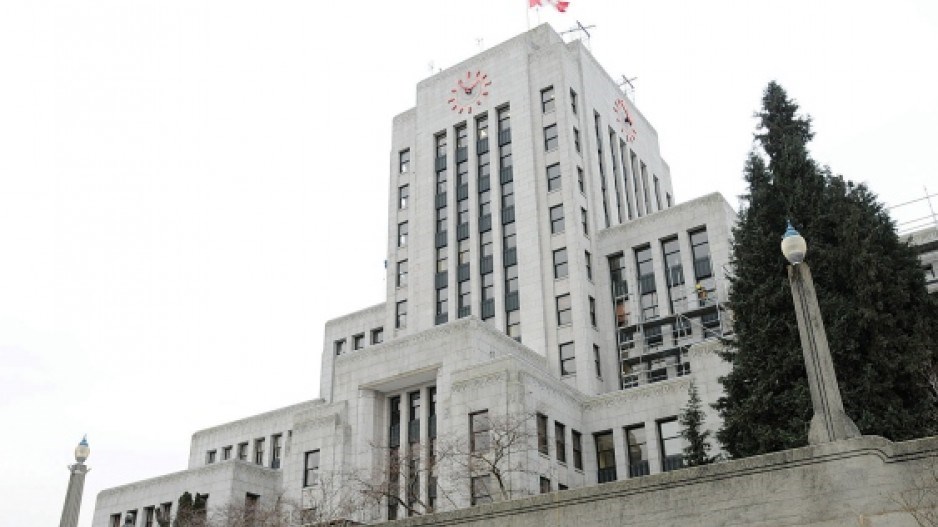Two years after Mayor Ken Sim and A Better City (ABC) swept to power in a landslide, Vancouverites will be heading back to the polls in the spring to render a midterm judgement on city hall.
A byelection was already slated for Vancouver city council following OneCity councillor Christine Boyle’s victory last October provincially in Vancouver-Little Mountain.
Following veteran Green councillor Adriane Carr’s resignation announcement on Wednesday due to frustrations with ABC’s style of governance, the city will be holding dual byelections later in the spring to conserve resources.
Under the Vancouver Charter, the by-election will be officially scheduled for a Saturday no later than 80 days after a chief election officer is in place to oversee the contest.
.
Former city councillor Colleen Hardwick said in a Thursday email to BIV that she will seek one of two nomination spots with Team for a Livable Vancouver.
Other candidates in the race, as of right now, are unconfirmed. Answering the question will be the easiest for ABC thanks to their farm teams on the school board and Park Board. Sim and his brain trust may look to promote Park Board commissioner Jas Virdi to City Council in hopes of solidifying ties with South Asian communities below 41st Avenue, and may choose to only run one candidate.
The opposition bloc at Cambie Street of the Greens and OneCity have, under an agreement by Carr and Boyle, agreed to field one candidate each. Further to the left, COPE splinter VoteSocialist has committed to not running a candidate, but COPE itself will run at least one candidate, . Hardwick’s localist outfit previously promised to run candidates for both vacancies.
The prospect of a council byelection will invoke much dread among the left. In the twilight of Vision Vancouver’s rule in 2017, the governing party crashed to fifth place with neophyte candidate Diego Cardona (with 11.3 per cent of the vote) while trying to retain Geoff Meggs’ council seat. Placing above him in the first-past-the-post trainwreck were OneCity candidate Judy Graves (13.2 per cent), Green candidate Pete Fry (20.3 per cent) and independent (backed by COPE) Jean Swanson (21.4 per cent), as the non-NPA vote split four ways. The NPA’s Hector Bremner strolled to victory in a divided field, claiming the seat with a mere 27.8 per cent of the vote amidst a pathetic turnout of 11 per cent.
This time, the stakes are higher. If ABC picks up both seats, it would enjoy a 9-to-1 control over city council, with a lonely Fry as the sole opposition voice. Such a situation would deprive Fry of the ability to get motions to the floor, unless a sympathetic ABC councillor broke ranks to second him. Furthermore, a failure among OneCity, COPE and the Greens to get their ducks in a row could spell disaster for further attempts at co-operation for 2026, to say nothing of what a lockout would mean.
So, what should we expect from the various players? Sim has drawn some controversy from online circles for supporting Bitcoin and casual wear on Remembrance Day, but the majority of Vancouverites who elected him in 2022 may simply shrug at such antics. ABC should still be worried, however. A Leger poll published in December showed the mayor and council 11 points underwater in approval.
In such an environment, the opposition senses opportunity. OneCity in particular will look to score a breakthrough beyond their predominantly white, university-educated, apartment-dwelling base in Grandview-Woodland and make inroads into the multiracial, working-class, suburban neighbourhoods of south Vancouver. COPE will be looking to do the same with meagre resources. TEAM should not be counted out either. While Hardwick finished below double digits in the 2022 mayoral race, their activists have stayed engaged against redevelopment proposals like the , and have been spotted at various community events since the election.
Given the dearth of polling and quirky turnout dynamics, nobody truly knows what to expect. While ABC has lists of supporters and a machine, will their support turn out to be a mile-wide and an inch deep? Byelections are often seen as referenda on governments, and typically draw more of those fiercely opposed to the incumbents rather than those with lukewarm support. With so many unknowns heading into the spring, the race may be anyone’s game.
Hugh Chan is a third-year student at UBC studying international relations and data science. You can find more coverage of municipal, provincial, federal and international politics across at .


